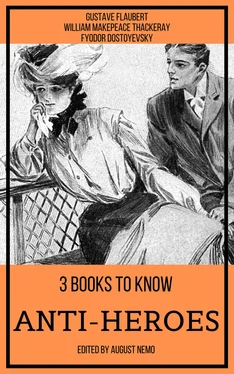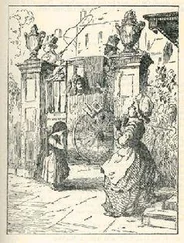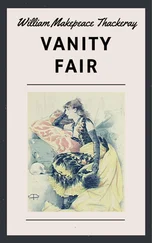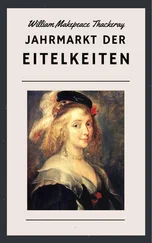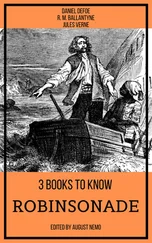As I got well, I saw that Nora’s visits became daily more rare: ‘Why don’t she come?’ I would say, peevishly, a dozen times in the day; in reply to which query, Mrs. Barry would be obliged to make the best excuses she could find,—such as that Nora had sprained her ankle, or that they had quarrelled together, or some other answer to soothe me. And many a time has the good soul left me to go and break her heart in her own room alone, and come back with a smiling face, so that I should know nothing of her mortification. Nor, indeed, did I take much pains to ascertain it: nor should I, I fear, have been very much touched even had I discovered it; for the commencement of manhood, I think, is the period of our extremest selfishness. We get such a desire then to take wing and leave the parent nest, that no tears, entreaties, or feelings of affection will counter-balance this overpowering longing after independence. She must have been very sad, that poor mother of mine—Heaven be good to her!—at that period of my life; and has often told me since what a pang of the heart it was to her to see all her care and affection of years forgotten by me in a minute, and for the sake of a little heartless jilt, who was only playing with me while she could get no better suitor. For the fact is, that during the last four weeks of my illness, no other than Captain Quin was staying at Castle Brady, and making love to Miss Nora in form. My mother did not dare to break this news to me, and you may be sure that Nora herself kept it a secret: it was only by chance that I discovered it.
Shall I tell you how? The minx had been to see me one day, as I sat up in my bed, convalescent; she was in such high spirits, and so gracious and kind to me, that my heart poured over with joy and gladness, and I had even for my poor mother a kind word and a kiss that morning. I felt myself so well that I ate up a whole chicken, and promised my uncle, who had come to see me, to be ready against partridge-shooting, to accompany him, as my custom was.
The next day but one was a Sunday, and I had a project for that day which I determined to realise, in spite of all the doctor’s and my mother’s injunctions: which were that I was on no account to leave the house, for the fresh air would be the death of me.
Well, I lay wondrous quiet, composing a copy of verses, the first I ever made in my life; and I give them here, spelt as I spelt them in those days when I knew no better. And though they are not so polished and elegant as ‘Ardelia ease a Love-sick Swain,’ and ‘When Sol bedecks the Daisied Mead,’ and other lyrical effusions of mine which obtained me so much reputation in after life, I still think them pretty good for a humble lad of fifteen:—
THE ROSE OF FLORA.
Sent by a Young Gentleman of Quality to Miss Brady, of Castle Brady.
On Brady’s tower there grows a flower,
It is the loveliest flower that blows,—
At Castle Brady there lives a lady
(And how I love her no one knows):
Her name is Nora, and the goddess Flora
Presents her with this blooming rose.
‘O Lady Nora,’ says the goddess Flora,
‘I’ve many a rich and bright parterre;
In Brady’s towers there’s seven more flowers,
But you’re the fairest lady there:
Not all the county, nor Ireland’s bounty,
Can projuice a treasure that’s half so fair!
What cheek is redder? sure roses fed her!
Her hair is maregolds, and her eye of blew
Beneath her eyelid is like the vi’let,
That darkly glistens with gentle jew?
The lily’s nature is not surely whiter
Than Nora’s neck is,—and her arrums too.
‘Come, gentle Nora,’ says the goddess Flora,
‘My dearest creature, take my advice,
There is a poet, full well you know it,
Who spends his lifetime in heavy sighs,—
Young Redmond Barry, ‘tis him you’ll marry,
If rhyme and raisin you’d choose likewise.’
On Sunday, no sooner was my mother gone to church, than I summoned Phil the valet, and insisted upon his producing my best suit, in which I arrayed myself (although I found that I had shot up so in my illness that the old dress was wofully too small for me), and, with my notable copy of verses in my hand, ran down towards Castle Brady, bent upon beholding my beauty. The air was so fresh and bright, and the birds sang so loud amidst the green trees, that I felt more elated than I had been for months before, and sprang down the avenue (my uncle had cut down every stick of the trees, by the way) as brisk as a young fawn. My heart began to thump as I mounted the grass-grown steps of the terrace, and passed in by the rickety hall-door. The master and mistress were at church, Mr. Screw the butler told me (after giving a start back at seeing my altered appearance, and gaunt lean figure), and so were six of the young ladies.
‘Was Miss Nora one?’ I asked.
‘No, Miss Nora was not one,’ said Mr. Screw, assuming a very puzzled, and yet knowing look.
‘Where was she?’ To this question he answered, or rather made believe to answer, with usual Irish ingenuity, and left me to settle whether she was gone to Kilwangan on the pillion behind her brother, or whether she and her sister had gone for a walk, or whether she was ill in her room; and while I was settling this query, Mr. Screw left me abruptly.
I rushed away to the back court, where the Castle Brady stables stand, and there I found a dragoon whistling the ‘Roast Beef of Old England,’ as he cleaned down a cavalry horse. ‘Whose horse, fellow, is that?’ cried I.
‘Feller, indeed!’ replied the Englishman: ‘the horse belongs to my captain, and he’s a better FELLER nor you any day.’
I did not stop to break his bones, as I would on another occasion, for a horrible suspicion had come across me, and I made for the garden as quickly as I could.
I knew somehow what I should see there. I saw Captain Quin and Nora pacing the alley together. Her arm was under his, and the scoundrel was fondling and squeezing the hand which lay closely nestling against his odious waistcoat. Some distance beyond them was Captain Fagan of the Kilwangan regiment, who was paying court to Nora’s sister Mysie.
I am not afraid of any man or ghost; but as I saw that sight my knees fell a-trembling violently under me, and such a sickness came over me, that I was fain to sink down on the grass by a tree against which I leaned, and lost almost all consciousness for a minute or two: then I gathered myself up, and, advancing towards the couple on the walk, loosened the blade of the little silver-hilted hanger I always wore in its scabbard; for I was resolved to pass it through the bodies of the delinquents, and spit them like two pigeons. I don’t tell what feelings else besides those of rage were passing through my mind; what bitter blank disappointment, what mad wild despair, what a sensation as if the whole world was tumbling from under me; I make no doubt that my reader hath been jilted by the ladies many times, and so bid him recall his own sensations when the shock first fell upon him.
‘No, Norelia,’ said the Captain (for it was the fashion of those times for lovers to call themselves by the most romantic names out of novels), ‘except for you and four others, I vow before all the gods, my heart has never felt the soft flame!’
‘Ah! you men, you men, Eugenio!’ said she (the beast’s name was John), ‘your passion is not equal to ours. We are like—like some plant I’ve read of—we bear but one flower and then we die!’
‘Do you mean you never felt an inclination for another?’ said Captain Quin.
‘Never, my Eugenio, but for thee! How can you ask a blushing nymph such a question?’
‘Darling Norelia!’ said he, raising her hand to his lips.
I had a knot of cherry-coloured ribands, which she had given me out of her breast, and which somehow I always wore upon me. I pulled these out of my bosom, and flung them in Captain Quin’s face, and rushed out with my little sword drawn, shrieking, ‘She’s a liar—she’s a liar, Captain Quin! Draw, sir, and defend yourself, if you are a man!’ and with these words I leapt at the monster, and collared him, while Nora made the air echo with her screams; at the sound of which the other captain and Mysie hastened up.
Читать дальше
